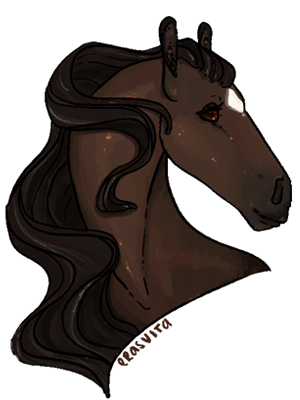
A S T E R I O N
in sunshine and in shadow*
Asterion listens to her reassurances and he smiles for her, the dutiful brother, but his thoughts are not so easily comforted: how long, after all, is ‘not long’ to a time-traveler? Time is no river to Florentine; it is a lake that she might splash in, and surface far from where she dove. It is a circle that eats its ending and starts anew.
When she returns, he knows, it is possible that he will be old - that he will be changed - that he will be gone altogether.
His heart is no sail, then, but an anchor. The saltwater on his cheeks does not care whether it was born by happiness or by sorrow - it streaks them dark all the same, it slips to the floor like the final breath of the floods. But Asterion follows her gaze across the room they stand in, stained glass and cobblestones, promises made and broken and held. Out the southern windows is the sea, out the northern the encircling arms of the city. Not whole but unbroken - waiting to rise.
“A holiday,” he repeats, and wonders when he learned the word. Surely as a colt at Ravos he would have laughed - a break from routine? Each of his days was a holiday, then, each an adventure. Now he thinks that there is only work before him, a yoke he wears even sleeping. When she mentions more names - one he does not know, one he does - he schools his expression to keep it from changing. Asterion’s thoughts about the antlered stallion (the once-god) are as tangled as old roots, as mixed as muddy water.
But he makes her happy - how can the king begrudge his sister that?
She speaks of dancing, she speaks of nymphs, and at last the bay smiles again. He does not miss the falter in her words, the lack of her customary certainty - because of it he voices no doubts of his own. He buries them deep, down in the soil of his own heart, to wither or take root.
“It sounds wonderful,” he says, and is almost surprised when it doesn’t feel like a lie. He touches his muzzle to the curve of her jaw, wishing they might fit together like foals. “And I don’t disagree that it will be a better place to heal.”
When she promises to return with a gift Asterion laughs, soft and low. “Bring me one of these anthousai,” he says, and tugs at a strand of her golden hair the way Cirrus might. “I will judge for myself who wears their flowers better.” At last he feels strong enough to lean away, to step apart from their embrace. Her last whisper, faint and uncertain, has him looking back at her. But there is no sorrow in his eyes, and they sting no longer with his saltwater tears.
The king is growing better at goodbyes. And this one, at least, is temporary.
“Likewise,” he tells her, and flicks his tail against her golden side. “But I shall try not to have the place in shambles when you return, if you promise to come back with two working wings.”
There is one more question on his tongue (one more he will speak; the others it is unfair to make her answer) but he hesitates for a moment. Long enough to walk to a window, clear and plainly paned, low enough that he might gaze out across the city and the hills that roll away until they fade to forest and to swamp. To his surprise he can feel jealousy prickling in him, at the adventure before her, at the marvelous things she might see - but oh, he welcomes it, for it is far better than sorrow or fear.
“How soon?” Now it is his turn to whisper, as though he is only asking the cool and silent glass, or perhaps the country beyond.
How strange, he thinks, that his sister may wear time around her neck on a silver chain, and yet he never feels they have enough.
@
